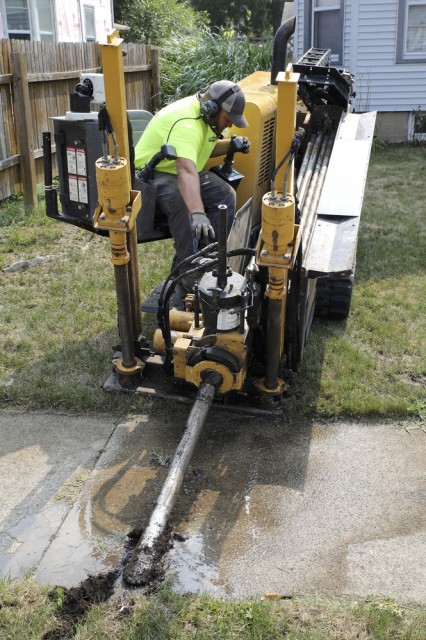Tackling lead service line replacement in Illinois with industry leaders
Lead service lines are common throughout the United States. For centuries, lead was the preferred element for plumbing. The word "plumber" even comes from the Latin word for lead. Lead pipes were popular because they resist pinhole leaks and can be easily bent to conform to the contours of buildings. Because of these advantages, water infrastructure frequently used lead until the 1960s.
However, exposure to lead in drinking water can cause lead poisoning and other health risks. To minimize exposure and protect public health, the Illinois Environmental Protection Agency (EPA) made lead illegal in 1986. The U.S. Environmental Protection Agency also established the Lead and Copper Rule to limit lead and copper exposure in drinking water. Part of the public health plan to reduce lead exposure includes water infrastructure improvement projects like lead service line replacement.
Below, we discuss lead service line replacement in Illinois, a state that has more lead water pipes than any other state in the U.S. With at least 686,000 lead water pipes connecting homes to water mains, lead service line replacement in communities across Illinois is challenging. By partnering with a water engineering team, municipal leaders get strategic solutions to deal with their lead service lines.
Increased support for lead service line replacement in Illinois
To encourage lead service line replacement in Illinois, the state passed a law in August 2021. The Lead Service Line Replacement and Notification Act makes Illinois the third state to mandate full lead service line replacement. The law:
- Prioritizes replacing all lead service lines in Illinois, especially those serving high-risk populations.
- Bans the partial replacement of lead service lines, in which only the utilities' side of the lead line is replaced while the privately owned portion remains.
Illinois funding for lead service line replacement
To support these efforts, the federal government has allocated $106 million for Illinois to replace its network of lead pipes. The U.S. EPA has also allocated federal and nonfederal funding to help Illinois and other states replace lead service lines. Key U.S. EPA funds for lead service line replacement include:
- Drinking Water State Revolving Fund (DWSRF).
- Reducing Lead in Drinking Water Grant.
- Lead Testing in School and Child Care Drinking Water Grant.
At the state level, the Illinois EPA has a State Revolving Fund (SRF) through the public water supply loan program. The fund provides loans with principal forgiveness to communities replacing lead service lines. While only some communities were eligible in the past, Illinois expanded program eligibility to include the entire state.
For communities in Illinois planning to upgrade water supply infrastructure, these loans provide sorely needed funding for lead service line replacement projects. However, municipal leaders often need help navigating the lengthy loan application process and strategizing lead service line replacement in their communities. To manage the design, construction and gradual replacement of lead service lines over years, communities need the expertise and experience of a water engineering team.
Challenges communities face when replacing lead service lines
Lead service line replacement requires a strategic approach because each property is different. Much of the replacement occurs in older residential properties, and service connection requirements vary widely. This means each home is unique from a construction standpoint. Construction also requires careful coordination to minimize the effect on property owners.
Complicated line ownership is another barrier communities face when establishing lead service line replacement programs. Service lines can be privately owned, Public Water System-owned or partly owned by private and public parties. The details of this ownership determine access rights for service line replacement and associated activities like digging and construction. It also affects who will bear the cost of maintenance, repair and replacement. Disputed ownership or mixed public-private ownership can result in partial replacement. This practice, now banned in Illinois, can further disturb the lead material in the remaining pipe, thereby increasing the risk of lead leaching into drinking water.
Lead service line replacement also requires large amounts of data. For municipalities to maintain accurate records on their lead service line inventory, they need documentation for replacement efforts at each property. They must also update and maintain large, complicated databases on service line locations and materials. Communities need accurate, up-to-date data to manage the complicated, multiyear work of service line replacement. Experienced water engineers can help navigate that process.
Partnering with a water engineering team for lead service line replacement
At Fehr Graham, our experienced team of water engineers understands the challenges municipalities face to replace lead service lines and upgrade water infrastructure. We have helped communities across Illinois remove lead service lines from their public water systems by managing and overseeing construction. We also help municipalities identify grants and other funding for their projects. Our lead service line replacement projects across Illinois include:
- Managing construction for lead service line replacement in Sycamore, Illinois. We helped the City secure funding through the Illinois EPA State Revolving Fund to replace lead service lines and complete the bidding process so Sycamore could hire contractors and we could oversee construction.
- Replacing water service lines in Rockford, Illinois. We managed the project from a contractual and construction standpoint and helped the City take advantage of a program to replace water service lines for free.
- Securing funding and overseeing the construction of lead service line replacement in Freeport, Illinois. From obtaining funds to overseeing construction, we provided end-to-end assistance to replace water lines in Freeport.
- Collaborating with the Village of Forreston, Illinois, on lead service line replacement. We have completed and received approval on the Illinois EPA project plan for lead service line replacement in the Village of Forreston to allow principal dollars to be allocated to the community. Fehr Graham is also providing construction observation services.
Fehr Graham aims to provide every community in Illinois with a cleaner municipal water supply. Our water engineering and construction services can help communities tackle lead service line replacement in Illinois. We provide industry-leading assistance with design, bidding, inspection, construction, data collection, funding and loan management.
To learn more about how Fehr Graham’s expertise in water engineering can help you with lead service line replacement in Illinois, contact us or give us a call at 815.394.4700.
Collaborative, Insightful, Results-Driven Solutions
Fehr Graham provides innovative engineering and environmental solutions to help improve the lives and communities of our customers.


